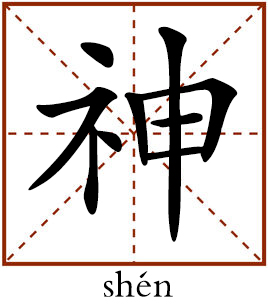God

This character means the general concep of gods, deity or divinity. It is also used to describe something marvelous or magical.
鬼斧神工
guǐ fǔ shén gōng
Gui refers to ghosts while fu is an axe. Shen means gods and gong refers to craftsmanship. The proverb, taken literally, means something made by gods or ghosts. It is usually used to describe things that are so excellent they seem to have been crafted by someone or something with supernatural powers.
The proverb originates from the Zhuangzi. “Qing the carpenter carved a piece of wood to make a bell frame. When the bell frame was completed, all those who saw it were astonished as though it were a supernatural accomplishment.” Since then, the term has been used to describe things that are extraordinary or delicate as if done by the spirits. It can be applied both to man-made items and to nature. Therefore, when the landscape of an area is fabulous and shocking, it can be depicted with this proverb.
故国神游
gù guó shén yóu
Gu guo refers to an ancient land or one’s native land. Shen you means an imaginary visit or to visit in one’s dream. This term is a verse from a poem, “Memories of the Past at Red Cliff,” and refers to arriving at the Red Cliff in the author’s imagination.
Its author, Sushi (1037-1101), is one of the greatest poets, writers and artists of the Song Dynasty (960-1279). The poem was inspired by the Battle of Chibi (208) between the southern warlords Liu Bei (161-223) and Sun Quan (182-252) and the northern warlord Cao Cao (155-220) at the end of the Han Dynasty (202 BCE-220). In this poem, Su honored Zhou Yu (175-210), the military general and strategist serving under Sun Quan, as he won the battle as the frontline commander at a relatively young age. Compared with Zhou’s achievement, Su felt frustrated because he was exiled from court due to his disagreement against a political faction. Therefore, Su wrote in this poem, “In fancy through those scenes of old I range,/ My heart overflowing, surely a figure of fun./ A man grey before his time./ Ah, this life is a dream,/ Let me drink to the moon on the river!”
(edited by REN GUANHONG)

 PRINT
PRINT CLOSE
CLOSE